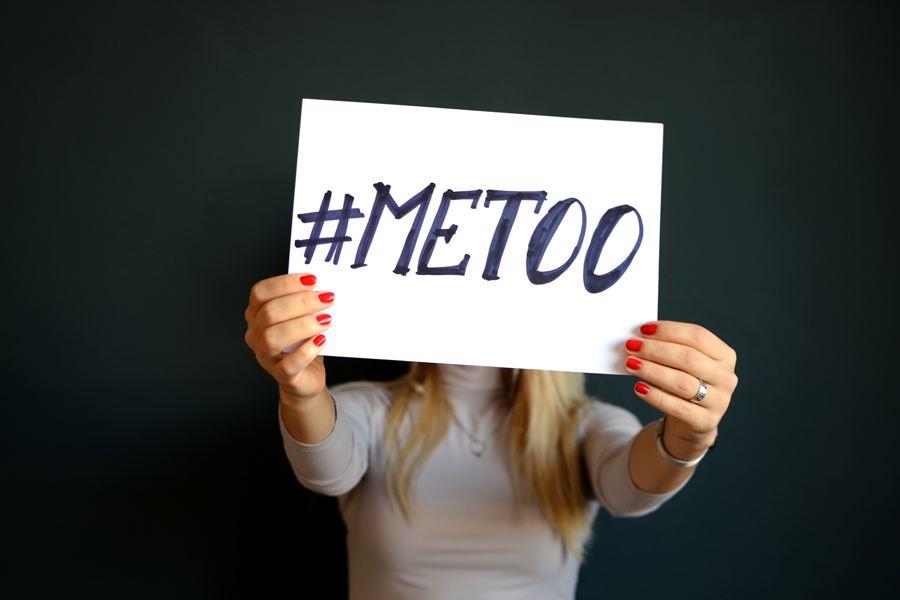
Did you hear Oprah’s speech at the 2018 Golden Globe awards?
Her final wish:
“And when that new day finally dawns, it will be because of a lot of magnificent women, many of whom are right here in this room tonight, and some pretty phenomenal men, fighting hard to make sure that they become the leaders who take us to the time when nobody ever has to say “Me too” again.”
The “Me too” movement is washing through many industries–entertainment, sports, politics, and others–but there is one area which has stayed strangely silent.
The spiritual community.
Despite what we all want to believe, spiritual communities, from churches and spiritual leaders, to meditation groups and yoga teachers, are not immune to abuses of power, sexual misconduct, and sexual harassment.
And there are many examples.
Years ago, my yoga community grappled with what to do when a senior yoga teacher was accused by multiple women of sexual misconduct. Just like Hollywood, many people had known what was going on but no one had spoken out.
…until one day, when many women spoke out.
So let’s start the conversation now. Let’s talk about the conditions that allow the abuse to exist and no one to speak out.
Spiritual communities have some unique challenges when addressing the issues of power and abuse. But once you recognize these traits, you will be sensitive to the signs and be able to choose healthy communities for your practice.
Why it’s hard for spiritual communities to admit to abuse
The myth of being “too spiritual” for abuse
When you visit a spiritual community or meditation group, one of the first things you’ll notice is how open and warm-hearted people are.
It’s baked in.
People are drawn to spiritual practice with the sweet desire to challenge themselves, grow, and become a wiser, more loving person. They are often seeking truth and connection.
With a whole community of people wanting to do good, you might think they would be safe from abuse.
It’s exactly this assumption that makes admitting there’s abuse particularly hard. No one wants to admit how flawed, and how completely human, they and their communities are.
It’s hard to be vulnerable–and self-protective
If you’re in a spiritual community, you’re probably there to grow.
This is a good thing.
You’re probably learning new ways to see your circumstances and looking deeply within yourself. You might be releasing old patterns.
Often this process of growing requires that you put your complete trust into your spiritual teacher and the process, even if you don’t understand it, or you think it’s odd.
But this openness has a shadow side. It can make you ignore your gut and get in situations which you wouldn’t tolerate in a different setting.
When your sense of self-protection is by-passed, you are vulnerable to abuses of power or sexual misconduct.
Cross-cultural social cues can be confusing
The final challenge to some spiritual communities is a cultural divide between the spiritual teacher and the followers. Without a shared cultural language, social signals can be misjudged. People without integrity can take advantage of this.
Signs that your spiritual community may be unhealthy
1. Questioning the teacher is discouraged.
If you notice behaviors in the teacher that are confusing, it’s natural to want to understand what is going on.
If your community discourages you from questioning him, that is a red flag.
Sometimes people don’t forbid you to ask question outright. Instead, you may be shamed or patronized. People might say things like, “When you practice more, you’ll understand.” In the worst cases, you could be shunned for not being an advanced practitioner or enough of a believer.
You are always free to ask about things that don’t seem right. If your community doesn’t agree, it may be time to look more deeply at what is going on.
2. The teacher’s helpers are anxious and competitive
Many spiritual leaders have a core group of trusted individuals who help them and support them.
However, sometimes those positions close to the teacher are used as bait to keep people from questioning abuse.
If the in-group around the leader is insecure and constantly competes for attention, or if the group is constantly changing as people in favor come and go, this could be a sign of something wrong.
Mature, stable leaders pick mature, stable helpers. They all work together without need to win the attention of the person in charge.
3. There are rumors of sexual, financial, or interpersonal misconduct
Rumors are tricky.
Of course, rumors aren’t necessarily true.
On the other hand, sometimes they are. Often rampant abuse is known by a wide circle. Disbelieving the rumors only helps keep what is going on secret.
If you hear rumors, ask questions. Find out what is true and what is not.
4. You feel ill-at-ease
Few people will say that the spiritual path is easy and without discomfort. It’s expected that you’ll feel awkwardness as you grow and transform.
But abandoning your common sense, instincts and gut-feelings is not part of that process.
If you feel uncomfortable in a situation, get yourself out of it. Reflect on it outside the group and see if your discomfort is a sign of personal growth–or a warning.
5. Your loved ones are not happy with your new practice
Sometimes when you join a new spiritual community or meditation group, your loved ones don’t like it. It’s different than what they know and they may not like your new ideas.
But sometimes your loved ones can see things you can’t.
Be careful not to dismiss their concerns too lightly.
6. The leader criticizes other types of practice
If your spiritual leader criticizes other forms of practice, claims to be the one true spiritual leader, or discourages you from leaving, be very cautious.
It’s OK to try different spiritual practices. Each technique, tradition, or teacher has something different to offer and you won’t know what is best for you until you try it.
Be wary if someone tries to convince you otherwise.
Be a new kind of spiritual practitioner
Abuse of power and sexual misconduct can happen anywhere, even in spiritual communities.
If we want to stop it, we need spiritual leaders and practitioners who are brave enough to stand up and say no. We need people who are brave enough to speak out when it does happen. We need to discard the assumption that “anything the spiritual leader does is OK.”
And most of all, we need to temper our desire to follow the spiritual path with common sense and healthy boundaries.
The “Me too” movement includes everyone in every circumstance. Let’s start the conversation in the meditation community so that no one has to say “Me too” in their spiritual practice.



Thank you so much for this information. May be all be free of the perpetrator’s actions.
Agreed, Laura.
I’m a guy in yoga and other groups that are full of women and run by women. I get good tips from some of the teachers and we do meditation. I consider some of them spiritual leaders. It’s disturbing to hear about the treatment they sometimes get and regularly dread. There’s a common theme in these stories from any group of ladies. They never tell the asshole who bugs them that they don’t like it. They always have reasons why they can’t. There not valid ever. They always suppose it’s an ultimatum that they don’t want to do. There being treated like non humans and their being perfect targets. In a support group I’ve tried to be helpful. Twice ladies didn’t like it and told everyone but me. I had given up on them anyway. No one even suggested that they should tell me what they were telling them. Things have gone bad for them. Me To should be Speak To. Once I was in a spiritual group led by a guy who I was never comfortable with. His misconduct issues would be acknowledged once in a while and he would say these misunderstandings were a normal thing in this business. Never knew what to think. Never got their stories, just heard about rumors. Well I might of been in something disgraceful. Don’t know because flags just don’t cut it.
Hi Doug,
It sounds like you’re frustrated because you don’t understand the why women don’t speak out about the abuses they have suffered. Am I understanding correctly?
It can be hard to understand someone in a situation you haven’t experienced. Many times, it seems like their behavior just doesn’t make sense. But if you truly want to understand, it takes 2 qualities.
First of all, you have to be open to truly listening. You have to open your heart to someone else’s experience and allow them to speak, even if it makes you uncomfortable to hear.
Secondly, you have to embrace the assumption that everyone wants to do good and be happy. If women don’t speak out, there must be a good reason. If you listen to your women friends with an open heart, assuming that they want to be happy, you may begin to hear their stories in a new light.
These qualities are the core of any spiritual practice–openness and loving compassion. You can apply them to any situation which is new and confusing.
Give this practice a try and let me know how it goes.
Thanks Julia
It might be true, but what is the relation between yoga, meditation and uncomfortable touch. Why anyone should be allowed to touch or behave inappropriately. We should we tolerate such behaviour whether it is a well known teacher, guru or anybody.
The girls do not openly come when we are tortured mentally and physically because they respect. They must understand the difference between fear and respect.
Hi Sunil,
It’s complicated why and how people tolerate abusive situations. But I agree that developing self-respect is a great first step. If a person has self-respect, they are much less likely to continue in an uncomfortable environment.
Thank you.
It is funny but I think that we must add a new chapter entitled “How to touch and behave like a real yogi” in all wellness courses including yoga, meditation, healing or anything else to avoid such shameful incidents.
That’s a great idea! I like it. I believe some trainings (like massage) include education like this but I don’t think meditation and other healing courses do. I agree that it would be a really helpful addition.
Thanks, Sunil.
Thanks Julia